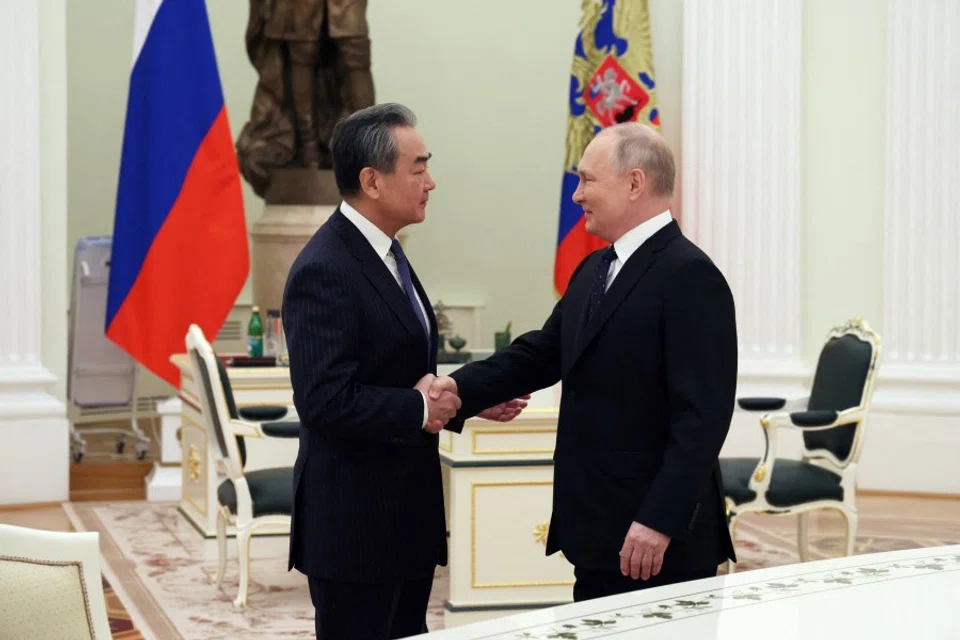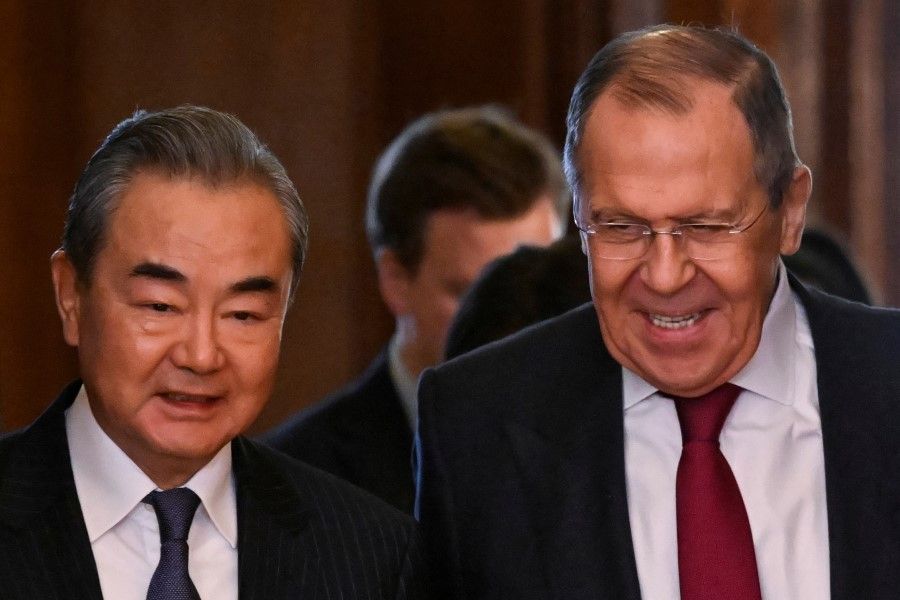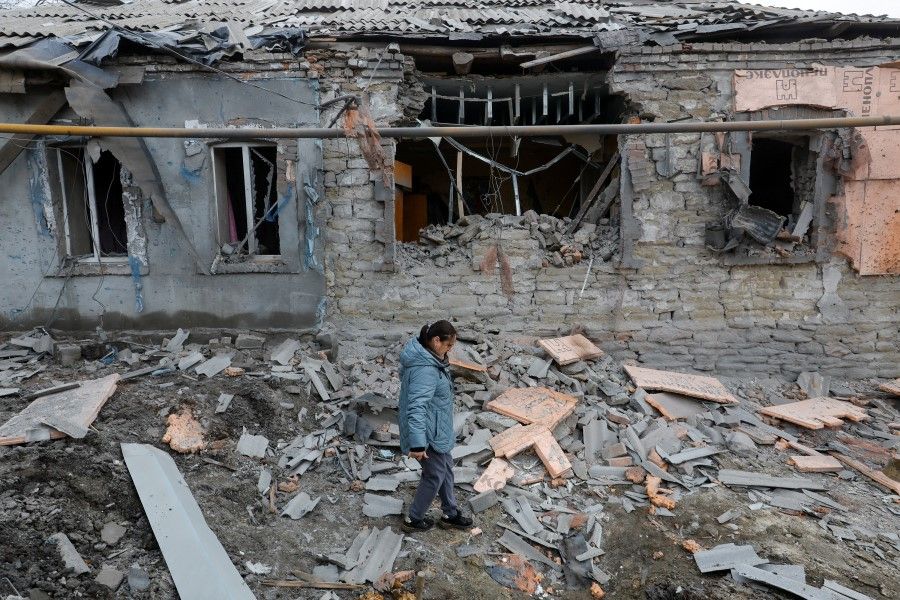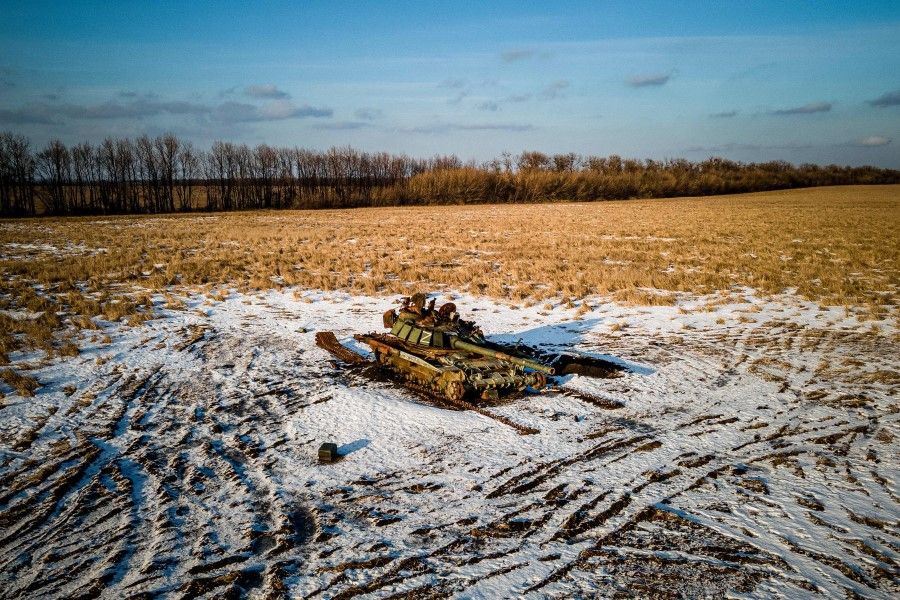What Russia's possible collapse could mean for China

Russia's war of aggression against Ukraine has placed renewed emphasis on the nature of Sino-Russian relations. The optics remain as good as ever, if not better. At their last meeting before the Russian full-scale invasion, President Xi Jinping went out of his way to assure President Vladimir Putin of their "no-limits" friendship.
Beijing has since doubled down on its support, causing growing alarm in the West. On 22 February, two days before the anniversary of the assault, China's top diplomat Wang Yi met Russian Foreign Minister Sergei Lavrov in Moscow, and President Xi himself is scheduled to visit "in the coming months" or even weeks.
Behind the happy facade, matters are less rosy. With Moscow pushing hard for serious military support, Beijing is forced into a delicate balancing act. As the crisis over Taiwan deepens, the need for a strategic partnership with Russia is becoming more accentuated. Yet, as the war in Ukraine drags on, the reputational damage from being on the side of the aggressor is piling up, threatening Chinese exports.
Beijing's recently presented "peace plan" reflects a mounting concern that Russia may indeed be looking at military defeat.

More than 140 countries have openly supported condemnations of Russia in the United Nations, and even some of its closest friends have broken ranks. During a recent visit to Kazakhstan, US Secretary of State Anthony Blinken secured a strategic deal with Russia's oldest and staunchest ally. Moscow has said it is "deeply concerned" that even Serbia, a traditional Slavic brother, is allegedly providing munitions for Ukraine, and the pressure is building on India to speak out against Russia.
How much should China do
Beijing's recently presented "peace plan" reflects a mounting concern that Russia may indeed be looking at military defeat. The core question concerns how far it is willing to go to ensure a stalemate, and a renewed freezing of the conflict. To date, its assistance has been limited to support for Russian propaganda, such as the trope that it was the US that blew up the Nord Stream pipelines. That may no longer be enough.
Secretary Blinken is presently leading a Western charge to dissuade Beijing from providing lethal military aid to Russia. China doing so would not only jeopardise its projection of being a neutral party interested in promoting peace, but also cause serious damage to its current ambition of courting the European Union for improved business relations. The implied tradeoff is made even more delicate by the fact that it arrives at a time when the Chinese economy is in dire need of traction to pick up after the Covid lockdowns.
For President Xi, this development represents a true watershed. During his time in power, he has been increasingly successful in exploiting Russian estrangement from the West. Modernisation of the Chinese military has profited from gaining access to Russian top-of-the-line military hardware, including stealth fighters, and hard-nosed bargaining has secured good deals on Russian oil and gas.
The looming downside is that allowing Russia to be pushed too hard may drive it into state collapse, which would have seriously negative consequences also for Beijing.

As the war enters its second year, the Western sanctions regime is pushing Russia ever deeper into dependence on China, the Middle Kingdom. Russian reserves are being depleted and the outlook is dismal. Export earnings are constrained by the combined facts that the market for Russian gas in Europe is dead, and that export of oil can only take place at heavily discounted prices. By alienating countries in Central Asia and the South Caucasus, Moscow adds to its own isolation by providing room for Turkey and Azerbaijan to emerge as big energy players.
This is where the Middle Kingdom will need to tread very gently. It may be tempting to allow Western sanctions to throttle the Russian economy. This would avoid the damage to its business prospects in the West that would follow from trying to help its strategic partner. And it would enhance the prospects of deriving added economic gain from Russian weakness. If Siberia and the Far East are reduced to a true bargain basement, Beijing may realise its old vision of Russia as its "northern resources territory".
The looming downside is that allowing Russia to be pushed too hard may drive it into state collapse, which would have seriously negative consequences also for Beijing.
The reason on all counts is that Russia has never developed autonomous institutions that may step into the breach when the state fails.
Russia on the brink of collapse could be to China's gain
There has been much recent speculation about a possible disintegration of the Russian Federation and/or a fully-fledged state collapse. While these notions are marred by conceptual confusion, they are not entirely without merit. Russia does have a powerful historical legacy of defeat in war leading to state collapse. It happened in 1598, when Muscovy collapsed; in 1917, when the Russian Empire collapsed; and in 1991, when the Soviet Union collapsed.
The reason on all counts is that Russia has never developed autonomous institutions that may step into the breach when the state fails. Russian autocracy has traditionally rested on unaccountable power based on vertical communication. It has never developed the form of horizontal relations that combine to form a society. Russia in consequence has remained a house of cards - when the strongman at the top fails, the whole edifice collapses.

There is presently a slight risk of what is known as a russkyi bunt - a senseless eruption of mass violence without leadership and/or purpose. But this outcome is not very likely. What in contrast is highly likely is that an accelerating erosion of the federal centre will trigger regional and local scrambles to take over resources, in the process further undermining the central power.
The real prize would be to place the Russian Pacific Fleet at the mercy of support from Beijing, and thus in the hands of the PLA.
The Russian Federation is not likely to disintegrate in the eyes of international law. But it will morph into a very different player. It will be ruled by increasingly predatory regional elites, and its main hallmark will be that the state monopoly on violence is decentralised and privatised, at a time when hundreds of thousands of embittered and hardened soldiers are returning from the war in Ukraine.
In the Russian Far East, this could entail the emergence of a de facto Chinese protectorate. Nominally, it would still be part of the Russian Federation, but in practice, it would be Chinese officials that rule via Russian proxies, and it would be Beijing that foots the bill for keeping order.
The returns would not be limited to a free hand in exploiting the region's vast natural resources, ranging from hydrocarbon extraction to predatory logging. The real prize would be to place the Russian Pacific Fleet at the mercy of support from Beijing, and thus in the hands of the PLA. In the mounting standoff over Taiwan, that would be a real asset.
Related: What a weakened Russia would mean for China | Will China and Russia join hands to push for an alternative world order? | Russia could decline into a failed state | China's softening stance on its 'no limits' relations with Russia | Chinese academic: Lessons for China from the Russia-Ukraine war
